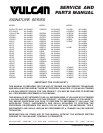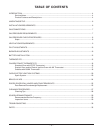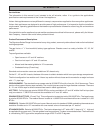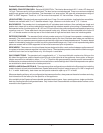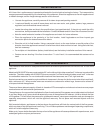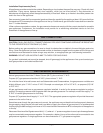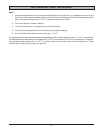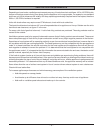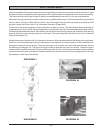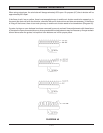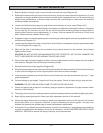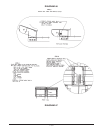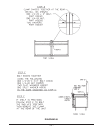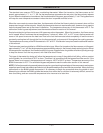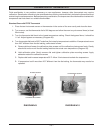
– 7 –
Installation Requirements (Cont.)
All appliances must be vented to the outside. Depending on local codes, the specifics may vary. Check with local
authorities. Fluing occurs because heat rises vertically, which has no force behind it. Any obstruction or
disturbance will negatively affect the appliances ability to flue itself. Make up or fresh air should be present low
and in the front of the appliance.
Gas connector hoses shall be commercial grade and have the capability of supplying at least 10% more fuel than
the maximum BTU consumption of the appliance or line up. Furthermore, gas connector hoses shall be no smaller
than
3
/4" inside diameter.
When units are mounted on casters, the gas connector hose must comply with the current standard for movable
gas appliances. Furthermore, the installation must provide for a restraining cable/chain device to limit the
movement of the appliance or line up.
GAS CONNECTIONS
CAUTION: ON ALL GAS SUPPLY CONNECTIONS ANY PIPE JOINT COMPOUND USED MUST BE RESISTANT
TO THE PROPERTIES OF PROPANE (LP) GAS.
Before making any gas connections, be sure to check for obstructions or debris in the manifold pipe and union
fitting. Once the appliance has been connected and the air has been purged from the system all the fittings and
connections must be tested for leaks using a soap solution, or an appropriate gas leak-sensing instrument.
WARNING: DO NOT USE AN OPEN FLAME TO CHECK FOR GAS LEAKS.
If a gas leak is detected and cannot be stopped, shut off gas supply to the appliance or line up and contact your
local gas provider or an Authorized Servicer.
GAS PRESSURE REQUIREMENTS
Natural gas pressure should be 5" Water Column (W.C.) plus or minus
1
/2" W.C.
Propane (LP) gas pressure should be 10" W.C. plus or minus
1
/2" W.C.
On units that have infra-red burners such as Salamanders and Cheesemelters, the gas pressure variables are
slightly different, plus
1
/2" W.C. minus .2" W.C. Example: on natural gas, 4.8" to 5.5" W.C., on propane (LP) 9.8"
to 10.5" W.C.
All gas appliances must have a gas pressure regulator installed. In order for the pressure regulator to perform
properly, the supply pressure must be greater than the operating pressure. For example, most cities supply 7" to
9" W.C. of natural gas pressure to a building.
Propane (LP) systems should supply 11" to 12" W.C. The appropriate pressure regulator will provide the correct
pressure to the unit or line up.
Sometimes even though the gas pressure is correct, the appliance may not be able to function properly because
the gas supply piping may be too small and is not able to supply the volume of gas required. It is recommended
that the piping be able to supply a minimum of 10% more fuel than the maximum BTU consumption of the appliance
or line up.
Because of the size of the Signature manifold (1
1
/4") when a 1
1
/4" pressure regulator is used, up to three appliances
may be connected to one pressure regulator. For example, a battery line up of six units must be connected to two
gas pressure regulators. A single appliance can be connected to a
3
/4" gas pressure regulator.



